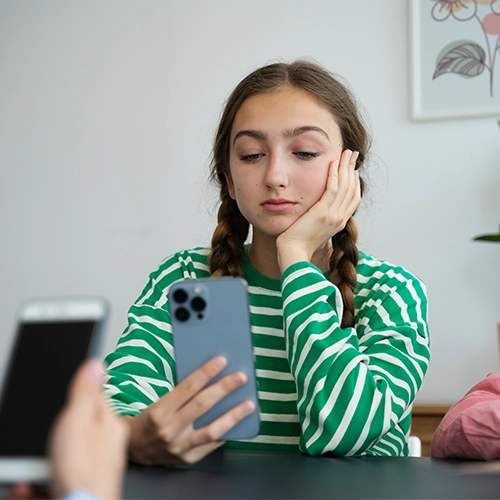Table of Contents
The Psychological Effects of Social Media. Social media has become an integral part of modern life, influencing various aspects of our daily interactions and self-perception. Its profound impact on mental health is an area of growing concern and research.
This analysis explores the psychological effects of social media on health, focusing on how platforms can shape user behavior, emotional well-being, and overall mental health.
As users navigate through constant streams of content, the potential for negative outcomes such as anxiety, depression, and low self-esteem increases.
Conversely, social media also offers opportunities for positive interactions and support networks that can enhance well-being. This paradox highlights the need for a deeper understanding of how social media usage affects mental health and the mechanisms through which these influences manifest.
How does social media affect mental health?
Social media can affect mental health in various ways. Here are some of the key impacts:
- Social Comparison: Constant exposure to idealized images and lifestyles on social media can lead to unfavorable comparisons, lowering self-esteem and triggering feelings of inadequacy.
- Fear of Missing Out (FOMO): Seeing others' seemingly exciting activities and experiences online can evoke FOMO, leading to anxiety and a sense of being left out.
- Cyberbullying: Social media platforms can be breeding grounds for cyberbullying, causing significant emotional distress and contributing to symptoms of depression and anxiety.
- Addiction: Excessive use of social media can lead to addiction-like behaviors, including compulsive checking and a preoccupation with online interactions, which can negatively impact mental well-being.
- Isolation and Loneliness: Paradoxically, despite its name, excessive social media use can lead to feelings of isolation and loneliness, especially if online interactions replace real-life social connections.
- Sleep Disruption: The blue light emitted by screens and the stimulating content on social media can disrupt sleep patterns, leading to fatigue, irritability, and difficulties in concentration.
- Impact on Body Image: Exposure to unrealistic beauty standards and filtered images on social media can contribute to body dissatisfaction and eating disorders, particularly among young users.
- Positive Effects: However, it's essential to note that social media can also have positive effects on mental health, such as providing social support, fostering connections, and spreading awareness about mental health issues. It largely depends on how individuals use and engage with social media platforms.
What are the signs of social media-induced anxiety?
Signs of social media-induced anxiety can vary from person to person, but common indicators may include:
- Excessive Worry: Constantly feeling anxious or stressed about interactions, posts, or responses on social media platforms.
- Fear of Judgment: Being overly concerned about how one's posts or pictures will be perceived by others, leading to hesitation or avoidance of sharing content.
- Comparative Behavior: Engaging in frequent comparison with others based on their social media posts, leading to feelings of inadequacy or jealousy.
- Obsessive Checking: Compulsively checking social media notifications, likes, comments, or follower counts, often interrupting daily activities or sleep.
- Physical Symptoms: Experiencing physical manifestations of anxiety such as increased heart rate, sweating, trembling, or gastrointestinal issues when using or thinking about social media.
- Withdrawal Symptoms: Feeling irritable, restless, or experiencing mood swings when unable to access social media for a period of time.
- Negative Self-Talk: Engaging in negative self-talk or self-criticism based on comparisons with others' seemingly perfect lives portrayed on social media.
- Avoidance Behavior: Avoiding social situations or real-life interactions due to anxiety stemming from social media-related concerns.
It's essential to recognize these signs and seek support if social media-induced anxiety begins to impact daily functioning or overall well-being. Strategies such as setting boundaries, limiting screen time, and seeking professional help from a therapist can be beneficial in managing social media-related anxiety.
Can social media usage affect self-esteem?
Yes, social media usage can significantly affect self-esteem. Here's how:
- Comparisons: Social media platforms often present idealized images and lifestyles, leading users to compare themselves unfavorably to others. This constant exposure to curated content can result in feelings of inadequacy and lower self-esteem.
- Validation Seeking: Seeking validation through likes, comments, and shares on social media can become a source of self-worth for some individuals. A lack of engagement or negative feedback may negatively impact self-esteem.
- Highlight Reel Effect: People tend to showcase only the highlights of their lives on social media, creating a distorted perception of reality. This can lead users to believe that others have perfect lives, further diminishing their own self-esteem.
- Cyberbullying: Negative interactions, criticism, or cyberbullying on social media can severely damage self-esteem and contribute to feelings of worthlessness or shame.
- Body Image Concerns: Exposure to unrealistic beauty standards and filtered images on social media can lead to body dissatisfaction and poor self-esteem, particularly among vulnerable groups such as adolescents and young adults.
- Imposter Syndrome: Comparing oneself to seemingly successful or accomplished individuals on social media can exacerbate feelings of imposter syndrome, where individuals doubt their abilities and feel like frauds despite their achievements.
Overall, while social media can provide opportunities for connection and self-expression, it's crucial for individuals to be mindful of its potential impact on self-esteem and to engage with platforms in a way that promotes positive self-image and well-being.
What strategies can help mitigate the negative effects of social media on mental health?
Several strategies can help mitigate the negative effects of social media on mental health:
- Set Boundaries: Establish specific time limits for social media usage each day and stick to them. Designate periods of the day when you will refrain from using social media altogether, such as during meals or before bedtime.
- Curate Your Feed: Follow accounts that inspire, educate, or uplift you, and unfollow or mute accounts that trigger negative emotions or comparisons. Curating a positive and supportive online environment can help reduce stress and anxiety.
- Practice Mindfulness: Be mindful of your emotions and reactions while using social media. Take breaks to check in with yourself and assess how certain content or interactions are making you feel. Practicing mindfulness techniques such as deep breathing or meditation can help you stay grounded and centered.
- Limit Passive Scrolling: Instead of mindlessly scrolling through your social media feed, engage in active participation by commenting, sharing meaningful content, or initiating conversations. This can foster genuine connections and reduce feelings of loneliness or isolation.
- Balance Online and Offline Activities: Allocate time for activities that nourish your mental and emotional well-being outside of social media, such as spending time with loved ones, pursuing hobbies, exercising, or engaging in nature.
- Seek Support: If you're struggling with negative emotions or mental health issues exacerbated by social media, don't hesitate to reach out for support. Talk to a trusted friend, family member, or mental health professional who can provide guidance and assistance.
- Practice Self-Compassion: Be kind to yourself and recognize that it's normal to have ups and downs, both online and offline. Practice self-compassion by treating yourself with the same kindness and understanding that you would offer to a friend facing similar challenges.
- Limit Notifications: Disable non-essential notifications on your devices to minimize distractions and interruptions from social media. This can help you regain control over your attention and reduce feelings of overwhelm or anxiety.
By implementing these strategies, you can cultivate a healthier relationship with social media and protect your mental well-being in the digital age.
Is there a link between social media and depression?
Yes, research suggests a correlation between heavy social media use and an increased risk of depression. Several factors contribute to this link:
- Social Comparison: Constant exposure to idealized images and lifestyles on social media can lead to negative self-comparison, feelings of inadequacy, and lower self-esteem, which are associated with depression.
- Cyberbullying: Social media platforms can be breeding grounds for cyberbullying, which can cause significant emotional distress and contribute to symptoms of depression, especially among adolescents and young adults.
- Isolation and Loneliness: Paradoxically, excessive social media use, particularly when it replaces real-life social interactions, can lead to feelings of isolation and loneliness, which are risk factors for depression.
- Sleep Disruption: The use of social media, especially before bedtime, can disrupt sleep patterns, leading to fatigue, irritability, and difficulties in concentration, which are common symptoms of depression.
- Negative Rumination: Spending excessive time on social media, particularly when exposed to negative content or interactions, can reinforce negative thought patterns and rumination, which are associated with depression.
- Addiction-like Behaviors: Excessive use of social media can lead to addiction-like behaviors, including compulsive checking and preoccupation with online interactions, which can negatively impact mental health, including depression.
While correlation does not imply causation, these findings suggest that there is a complex relationship between social media usage and depression. It's important for individuals to be mindful of their social media habits and seek support if they experience symptoms of depression or other mental health issues exacerbated by social media use.
How can one use social media responsibly to enhance mental health?
Using social media responsibly can help enhance mental health. Here are some tips to achieve that:
- Set Boundaries: Establish specific time limits for social media usage each day and stick to them. Designate periods of the day when you will refrain from using social media altogether, such as during meals or before bedtime.
- Curate Your Feed: Follow accounts that inspire, educate, or uplift you, and unfollow or mute accounts that trigger negative emotions or comparisons. Curating a positive and supportive online environment can help reduce stress and anxiety.
- Engage Mindfully: Be mindful of your emotions and reactions while using social media. Take breaks to check in with yourself and assess how certain content or interactions are making you feel. Limit passive scrolling and actively engage with content that adds value to your life.
- Balance Online and Offline Activities: Allocate time for activities that nourish your mental and emotional well-being outside of social media, such as spending time with loved ones, pursuing hobbies, exercising, or engaging in nature.
- Practice Authenticity: Be authentic and genuine in your online interactions. Avoid comparing yourself to others and resist the urge to portray an unrealistic image of yourself. Embrace imperfection and celebrate your uniqueness.
- Seek Support: If you're struggling with negative emotions or mental health issues exacerbated by social media, don't hesitate to reach out for support. Talk to a trusted friend, family member, or mental health professional who can provide guidance and assistance.
- Limit Notifications: Disable non-essential notifications on your devices to minimize distractions and interruptions from social media. This can help you regain control over your attention and reduce feelings of overwhelm or anxiety.
- Practice Self-Care: Prioritize self-care practices that promote mental and emotional well-being, such as mindfulness meditation, journaling, exercise, and adequate sleep. Take breaks from social media when needed to recharge and rejuvenate.
By incorporating these strategies into your social media usage, you can cultivate a healthier relationship with technology and harness its potential to enhance your overall well-being.
FAQ
How does social media affect mental health?
Social media can affect mental health both positively and negatively. It can lead to increased feelings of loneliness, anxiety, and depression, especially with excessive use. However, it can also provide valuable social connections and support networks that enhance users' emotional well-being.
What are the signs of social media-induced anxiety?
Signs include excessive worry about social media interactions, discomfort when unable to access social media, and a preoccupation with likes, comments, or online status. Physical symptoms may include restlessness, increased heart rate, and difficulty concentrating.
Can social media usage affect self-esteem?
Yes, social media can significantly impact self-esteem. Constant exposure to curated portrayals of others' lives can lead to unfavorable comparisons and feelings of inadequacy. Conversely, positive feedback on social media can boost self-esteem.
Are certain age groups more vulnerable to the effects of social media on mental health?
Young adults and teenagers are particularly susceptible due to their developmental stages and high usage rates. They are more likely to be influenced by social comparison and peer approval, key aspects of social media interaction.
What strategies can help mitigate the negative effects of social media on mental health?
Effective strategies include setting time limits for social media use, following accounts that foster positive interactions, and engaging in activities that promote well-being away from screens. Mindfulness and social media literacy programs can also help users navigate online environments more healthily.
Is there a link between social media and depression?
Research suggests a correlation between heavy social media use and an increased risk of depression. This risk is partly due to negative comparison, cyberbullying, and the feeling of time wasted that can come from excessive use.
How can one use social media responsibly to enhance mental health?
To use social media responsibly, individuals should be selective with their interactions, utilize features designed to manage usage time, and engage in meaningful connections rather than passive scrolling. Balancing online interactions with real-life connections is also crucial.
What role do parents play in managing the effects of social media on their children?
Parents can help by monitoring their children’s social media use, encouraging open discussions about online experiences, and setting a good example with their own social media habits. Education on digital citizenship and the potential pitfalls of social media is also beneficial.




















